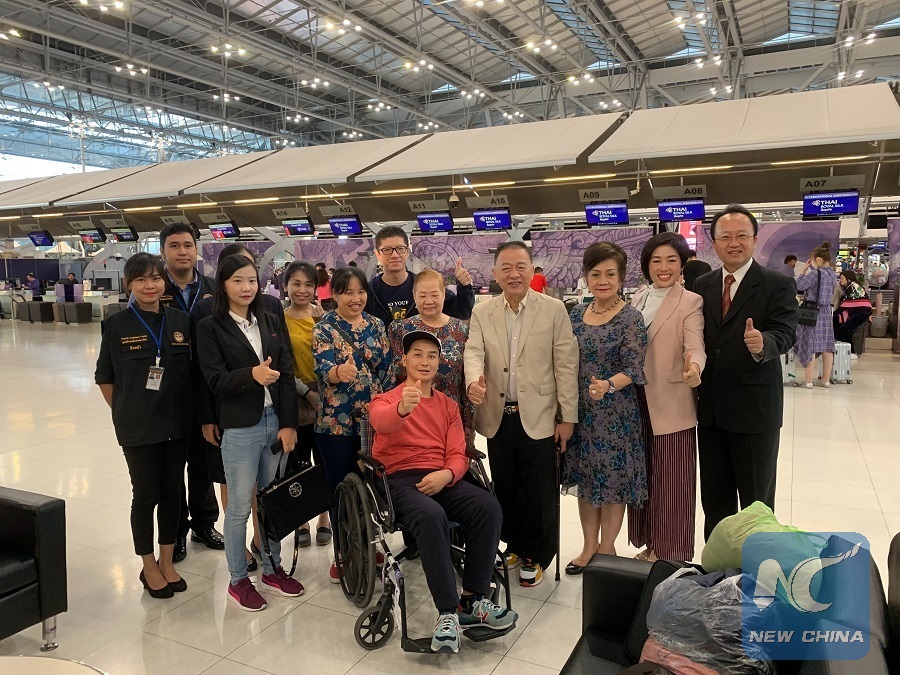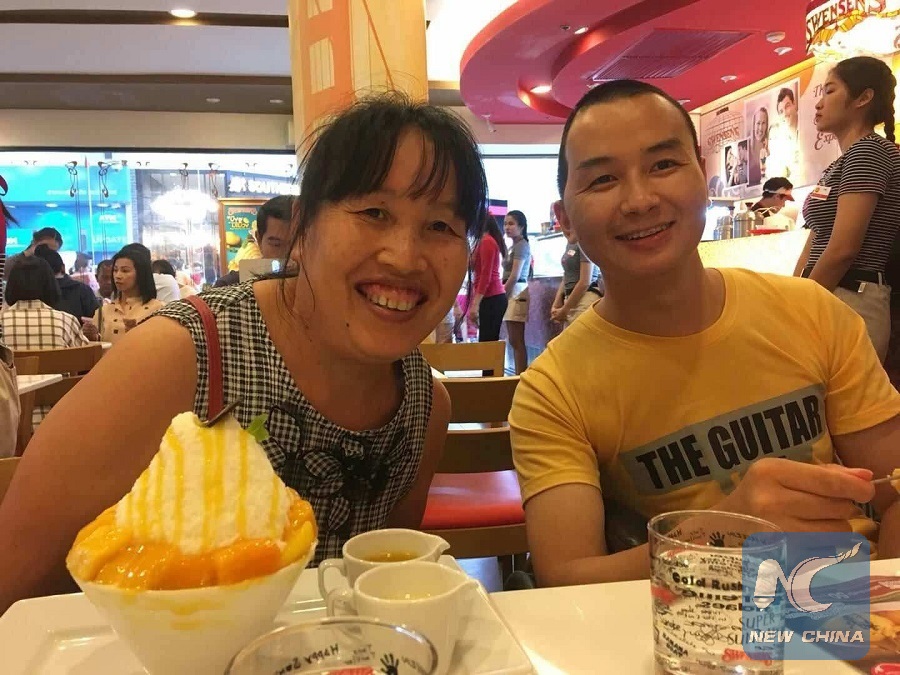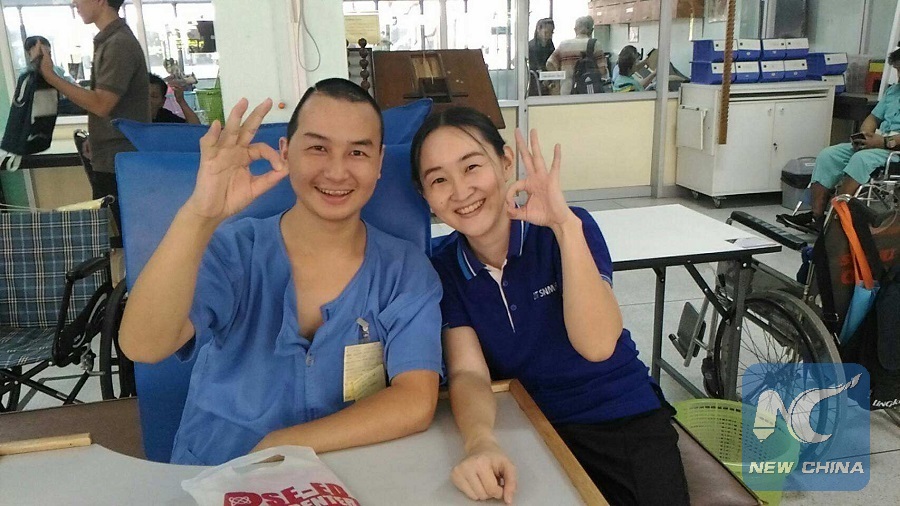
Volunteers and people from organizations of overseas Chinese go to Bangkok's Suvarnabhumi Airport to see Zheng Jiu and his mother off on Feb. 8, 2019. (photo courtesy of Zheng Jiu)
BANGKOK, March 10 (Xinhua) -- Zheng Jiu arrived at Bangkok's Suvarnabhumi Airport on Feb. 8 with his mother Ma Daifeng to travel back to China, after spending 1,271 in Thailand since the Aug. 17, 2015 Bangkok bombing blast.
On Aug. 17, 2015, a deadly blast hit the Erawan Shrine at the Ratchaprasong intersection in downtown Bangkok, leaving 20 dead and 125 injured. Zheng was badly injured in his head in the blast.
Two surgeries were taken before Zheng's life was saved by doctors, after which he lapsed into unconsciousness.
"He was injured so severely, he lost part of his head, he might just lie on bed unconsciously for all his life, we didn't have much hope for him," said Matthana Moonjan, a lawyer and a volunteer who kept helping Zheng for the past more than three years, "only his mother insisted that Zheng would wake up."
Born in 1992, Zheng was the only child of his family. He just began to work in 2015 after studying Thai language in Chiang Mai University.
An anonymous Chinese volunteer said she still remembered a picture that Ma Daifeng, Zheng's mother, crying in front of the immigration in Chengdu, Sichuan Province in China when she was traveling for Bangkok, "she looked very sad."
Ma arrived at the hospital two day after the blast. The heartbreaking mother wiped her son's body, read novels to him and called his name again and again while Zheng was unconscious.
Zheng woke up just before the Chinese Lunar New Year in 2016, which he said was owing to one volunteer Brother Chen who "scolded" him for being unfilial to his parents.
"The first thing that Zheng remembered when he woke up was his mother's mobile phone number, he told me", Matthana told Xinhua.
Zheng's father, who worked at a construction site in Belarus, also came to take care of his son just after Ma in Bangkok. Since the family is not wealthy, Zheng's father went back to China to work to support the family after Zheng woke up.
On Feb. 22, 2019, Zheng posted a short memoir about his three years in Bangkok on social media.
Soon after he woke up, his voice was so faint that even his parents could not hear. When nurses checked his body he felt painful and wanted to ask them to do it lightly, but no one could hear him so he cried and his mother also cried, saying, "Don't cry, you are getting well, we can take it step by step."
One day in 2016, Ma asked her son to try to turn over his body on bed but he could not. Then Ma pushed his back and supported him in doing so. Zheng practiced five to six times daily with his mom's help and after three months, he could finally rolled his body by himself.
On Oct. 5, 2016, doctors of Chulalongkorn Hospital undertook the third surgery to take remains of the explosive out of his head. Zheng then underwent another surgery on his right ankle.
It was a very tough process of learning how to stand up again and walk afterward for Zheng.
"I remembered his mother moving back forward step by step while holding Zheng in her arms at the yard of the hospital so Zheng's feet can feel the land," the anonymous volunteer told Xinhua, Zheng did not have the strength to walk at all so all his weight was on her, "that must be very hard."
In Zheng's memoir, he recalled that he had to wear orthopedic shoes after the surgery on his right ankle.
"At first I can just walk five to six steps, it would be painful on my ankle if I walked more, and I said how can I walk with these shoes, but my mother said, you have to if you really want to walk again."
Ma held her son's hands to let him practice to walk for half a year and then Zheng decided to walk on his own.
He was so afraid of falling down at first but his mother told him, "You have to get accustomed to this as mom cannot protect you all over your life."
In 2018, Zheng and his mother moved to Sirindhorn National Medical Rehabilitation Institute for further rehabilitation practice.
On June 3, 2018, Xinhua reporters saw Zhen, looking very determined, transferring little plastic balls from a basket to another in the rehabilitation room.
Later on that day, his friends came to see him, and he greeted them at the corridor in his wheelchair.
He smiled and made jokes of his friends, which was a great comfort to his friends and many volunteers as his humor was not taken away.
Ma always smiled as well. Zheng, whom Ma said was a shutterbug, earlier posted a photo of Ma on his wechat and saying, "My mother is still young and beautiful."

This photo shows Zheng Jiu and his mother Ma Daifeng. (photo courtesy of Zheng Jiu)
On Jan. 23, 2019, Zheng said on his wechat that he was entering e-commerce industry since he launched a online shop selling Thai fruits, latex pillows, etc.
"Several volunteers encouraged him and helped him in doing so which is a way to make him capable of making a life by himself," the anonymous volunteer told Xinhua, adding"We all become close friends."
Zheng now still needs to take anti-epileptic drugs everyday.
"I think his recovery till now owed to his great mother," said Kobkarn, "and Zheng was great boy as he told me he has to stand up again to take care of his mom."
Soon after the bombing, many volunteers, both Chinese working in Thailand and Thais who can speak Chinese, rushed to hospitals to offer help and they later formed a group of volunteers in case of any emergency.

Photo taken on March 15, 2018 shows Zheng Jiu and a Japanese volunteer who worked at Sirindhorn National Medical Rehabilitation Institute. (photo courtesy of Zheng Jiu)
In his memoir, Zheng thanked many volunteers, Brother Chen, Sister Yuhong, and Doctor Sun who offered him free acupuncture.
He also thanked the Chinese Embassy in Thailand and Thai Princess Maha Chakri Sirindhorn as well as others.
The Chinese Embassy in Thailand told Xinhua that they sent officials to visit the mother and the son regularly, give them some basic necessities, and helped them in negotiating with the Thai side.
According to Zheng, volunteers and officials, and Princess Sirindhorn gave the young man financial support and other forms of support for his treatment and life in Thailand. Thai minister of public health, ministry of tourism and sports also offered them much assistance.
Wang Zhimin, the president of Thailand Council for the Promotion of Peaceful Unification, bought air tickets for the mother and the son this time. He also joined Li Chunlin, counselor of Overseas Chinese Affairs from the Chinese Embassy, volunteer Matthana and Thai officials to see Zheng and his mother off at the airport.
Matthana's husband, Shi Datuo, also a volunteer, said story tells the friendship between the two peoples.
When recently asked about what he wished for now, Zheng answered, "good health."

